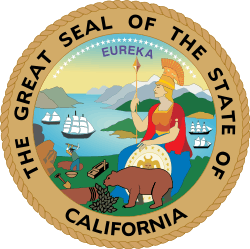California's congressional districts

California is the most populous U.S. state and as a result has the most representation in the United States House of Representatives, with 53 Representatives. Each Representative represents one congressional district.
1992: Court ordered districts
The 1990 census gave California seven additional congressional seats. Attempts by the legislature to draw up new districts were unsuccessful, as three different plans drawn up by the Democratic-controlled Legislature were vetoed by Republican governor Pete Wilson. In September 1991 the California Supreme Court took jurisdiction over the redistricting process to break the stalemate.[1][2] Districts were drawn up by a panel of retired judges.
2002: Bipartisan gerrymandering

After the 2000 census, the California State Legislature was obliged to complete redistricting for House of Representatives districts as well as California State Assembly and California State Senate districts. It was mutually decided by legislators that the status quo in terms of balance of power would be preserved - a so-called Incumbent Protection Plan.[3] A bipartisan gerrymandering effort was done, and districts were configured in such a way that they were dominated by one or the other party, with few districts that could be considered competitive. In some cases this resulted in extremely convoluted boundary lines.
In the 2004 elections, a win by less than 55 percent of the vote was quite rare. This was seen in only five out of 80 State Assembly seats and two out of 20 State Senate seats up for election. The congressional seats were even less competitive than the state legislative districts - just three of the 53 districts were won with less than 60 percent majority in 2004.
Results in some districts during the 2000s
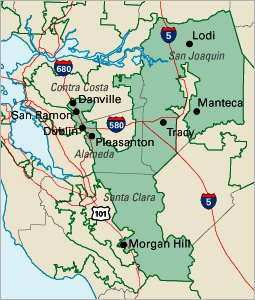
In earlier elections, the almost evenly divided 10th district was a focus of national attention, owing to its balanced electorate with a slight Republican edge in registration and a Republican advantage in electoral participation. Since its creation in 1990, the district had been held by a Republican, Congressman Bill Baker, a former State Assembly member, for whom the district was designed. After several weak challenges to the seat by Democrats, the election was hotly contested in 1996 by a newcomer to politics, Ellen Tauscher, a candidate with sufficient funds of her own to be competitive against the incumbent. Receiving a great amount of grass roots support from local Democratic clubs and votes from moderate Republican women, her defeat of Congressman Baker was considered a great victory for what many consider a 'middle of the road' Democrat. Her district became 'safe' (she won reelection with 65.8 percent of the vote in 2004) and the subsequent congressional election drew no national attention to California.
In 2006, the only Congressional seat in California to change hands was the 11th, which is made up of some of the inland parts of the San Francisco Bay Area plus portions of the Central Valley east of the Bay Area. It was taken from long-time Republican incumbent Richard Pombo by Democratic political neophyte Jerry McNerney.
The 4th district, north of Sacramento, where Democratic Air Force veteran Charlie Brown faced off against Republican State Senator Tom McClintock to take the seat held by retiring Republican Congressman John Doolittle, was considered competitive. McClintock won by a slim margin.
The 50th district, in the San Diego suburbs, where Francine Busby (D) challenged Brian Bilbray (R), first in a special election to replace convicted felon Duke Cunningham (R), and then in the general election, probably would have been very competitive if Busby had not made an ill-considered and poorly received remark that became connected to the locally-sensitive issue of immigration: she remarked that one does not "need papers" to vote. Indeed, California law prohibits poll workers from requesting ID under most circumstances.
2012: Citizens Redistricting Commission
Proposition 11, a California ballot proposition known as the Voters FIRST Act, was approved by the voters on November 4, 2008. It removed from the California Legislature the responsibility for drawing the state's congressional districts, and gave the responsibility instead to a 14-member Citizens Commission.[4] It also required that the districts drawn up (1) comply with the federal Voting Rights Act; (2) make districts contiguous; (3) respect, to the extent possible, the integrity of cities, counties, neighborhoods and "communities of interest"; and (4) to the extent possible, make districts compact. Several of these terms are not defined in law.
Governor Arnold Schwarzenegger had earlier proposed placing the redistricting process in the hands of retired judges, which was on the November ballot as an initiative in a special election (called by the Governor on June 14, 2005), Proposition 77. The special election was held on November 8, 2005. However, the initiative was overwhelmingly defeated, with 59 percent voting no. All initiatives, including those proposed by the Governor's allies and several independent initiatives, failed that year.
The California Citizens Redistricting Commission certified final district maps on August 15, 2011, and they took effect with the 2012 election.[5] The new districts are described as more "purple" than "red" or "blue" - that is, more mixed in electoral composition compared to the mostly "safe" districts of the previous decade, where incumbents were almost guaranteed re-election. An interactive map comparing the old districts with the new ones is available via the Los Angeles Times.[6]
These new districts, combined with demographic trends over several decades that favored the Democratic party, resulted in a gain of four House of Representatives seats for California Democrats in this election. For details see United States House of Representatives elections, 2012#California
Current districts and representatives
List of members of the Californian United States House delegation, district boundaries, and their political ratings in the 113th United States Congress. The delegation has a total of 53 members, with 39 Democrats (including minority leader Nancy Pelosi) and 14 Republicans (including majority leader Kevin McCarthy).
| District | Representative | Party | CPVI | Incumbent time in office | District map |
|---|---|---|---|---|---|
| 1st |  Doug LaMalfa (R-Richvale) Doug LaMalfa (R-Richvale) |
Republican | R+10 | January 3, 2013 – present | .tif.png) |
| 2nd | 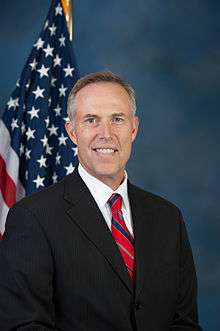 Jared Huffman (D-San Rafael) Jared Huffman (D-San Rafael) |
Democratic | D+20 | January 3, 2013 – present | .tif.png) |
| 3rd | 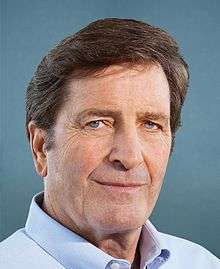 John Garamendi (D-Walnut Grove) John Garamendi (D-Walnut Grove) |
Democratic | D+3 | November 3, 2009 – present | .tif.png) |
| 4th | |
Republican | R+10 | January 3, 2009 – present | .tif.png) |
| 5th | 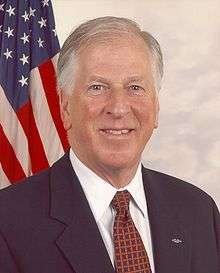 Mike Thompson (D-St. Helena) Mike Thompson (D-St. Helena) |
Democratic | D+19 | January 3, 1999 – present | .tif.png) |
| 6th | |
Democratic | D+18 | March 8, 2005 – present | .tif.png) |
| 7th | 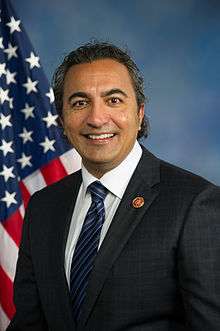 Ami Bera (D-Elk Grove) Ami Bera (D-Elk Grove) |
Democratic | EVEN | January 3, 2013 – present | .tif.png) |
| 8th |  Paul Cook (R-Yucca Valley) Paul Cook (R-Yucca Valley) |
Republican | R+10 | January 3, 2013 – present | .tif.png) |
| 9th |  Jerry McNerney (D-Stockton) Jerry McNerney (D-Stockton) |
Democratic | D+6 | January 3, 2007 – present | .tif.png) |
| 10th | 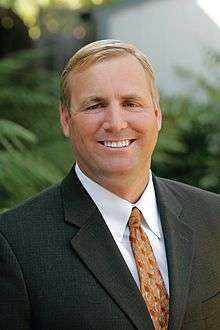 Jeff Denham (R-Atwater) Jeff Denham (R-Atwater) |
Republican | R+1 | January 3, 2011 – present | .tif.png) |
| 11th | 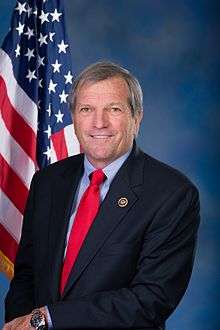 Mark DeSaulnier (D-Concord) Mark DeSaulnier (D-Concord) |
Democratic | D+17 | January 3, 2015 – present | .tif.png) |
| 12th | 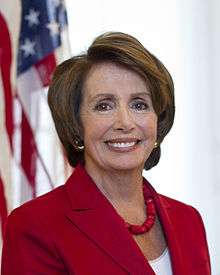 Nancy Pelosi (D-San Francisco) Nancy Pelosi (D-San Francisco) |
Democratic | D+34 | June 2, 1987 – present | .tif.png) |
| 13th | 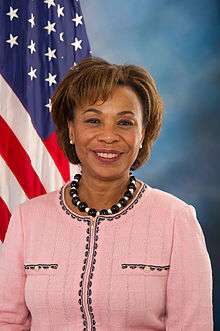 Barbara Lee (D-Oakland) Barbara Lee (D-Oakland) |
Democratic | D+37 | April 7, 1998 – present | .tif.png) |
| 14th | 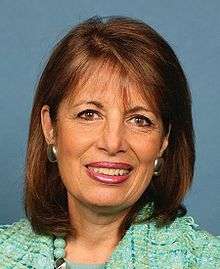 Jackie Speier (D-Hillsborough) Jackie Speier (D-Hillsborough) |
Democratic | D+23 | April 8, 2008 – present | .tif.png) |
| 15th |  Eric Swalwell (D-Dublin) Eric Swalwell (D-Dublin) |
Democratic | D+16 | January 3, 2013 – present | .tif.png) |
| 16th | 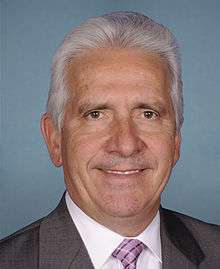 Jim Costa (D-Fresno) Jim Costa (D-Fresno) |
Democratic | D+7 | January 3, 2005 – present | .tif.png) |
| 17th | 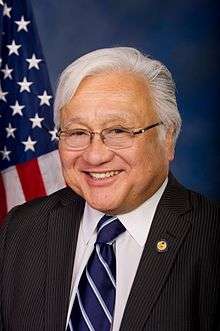 Mike Honda (D-San Jose) Mike Honda (D-San Jose) |
Democratic | D+20 | January 3, 2001 – present | .tif.png) |
| 18th |  Anna Eshoo (D-Atherton) Anna Eshoo (D-Atherton) |
Democratic | D+18 | January 3, 1993 – present | .tif.png) |
| 19th |  Zoe Lofgren (D-San Jose) Zoe Lofgren (D-San Jose) |
Democratic | D+19 | January 3, 1995 – present | .tif.png) |
| 20th |  Sam Farr (D-Carmel) Sam Farr (D-Carmel) |
Democratic | D+21 | June 8, 1993 – present | .tif.png) |
| 21st | 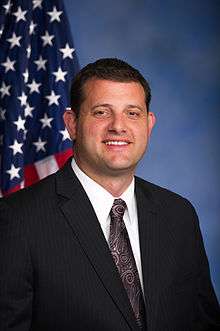 David Valadao (R-Hanford) David Valadao (R-Hanford) |
Republican | D+2 | January 3, 2013 – present | .tif.png) |
| 22nd | 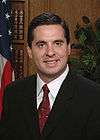 Devin Nunes (R-Tulare) Devin Nunes (R-Tulare) |
Republican | R+10 | January 3, 2003 – present | .tif.png) |
| 23rd | 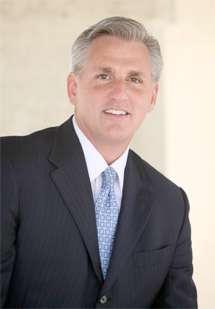 Kevin McCarthy (R-Bakersfield) Kevin McCarthy (R-Bakersfield) |
Republican | R+16 | January 3, 2007 – present | .tif.png) |
| 24th | 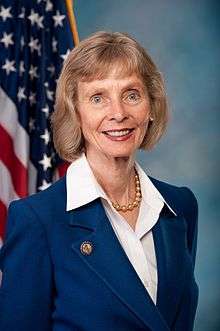 Lois Capps (D-Santa Barbara) Lois Capps (D-Santa Barbara) |
Democratic | D+4 | March 10, 1998 – present | .tif.png) |
| 25th | 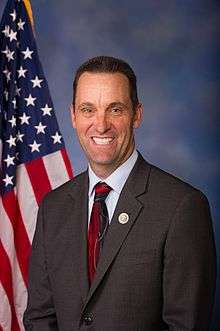 Steve Knight (R-Palmdale) Steve Knight (R-Palmdale) |
Republican | R+3 | January 3, 2015 – present | .tif.png) |
| 26th | 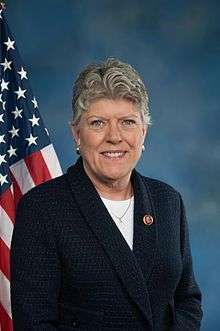 Julia Brownley (D-Oak Park) Julia Brownley (D-Oak Park) |
Democratic | D+4 | January 3, 2013 – present | .tif.png) |
| 27th |  Judy Chu (D-Monterey Park) Judy Chu (D-Monterey Park) |
Democratic | D+11 | July 14, 2009 – present | .tif.png) |
| 28th | 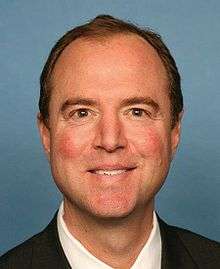 Adam Schiff (D-Burbank) Adam Schiff (D-Burbank) |
Democratic | D+20 | January 3, 2001 – present | .tif.png) |
| 29th |  Tony Cardenas (D-San Fernando Valley) Tony Cardenas (D-San Fernando Valley) |
Democratic | D+25 | January 3, 2013 – present | .tif.png) |
| 30th |  Brad Sherman (D-Sherman Oaks) Brad Sherman (D-Sherman Oaks) |
Democratic | D+14 | January 3, 1997 – present | .tif.png) |
| 31st | 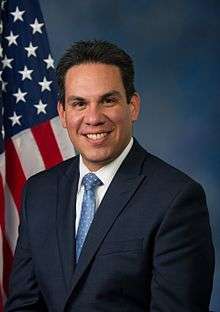 Pete Aguilar (D - Fontana) Pete Aguilar (D - Fontana) |
Democratic | D+5 | January 3, 2015 – present | .tif.png) |
| 32nd | 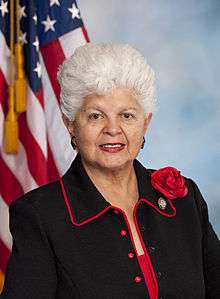 Grace Napolitano (D-Norwalk) Grace Napolitano (D-Norwalk) |
Democratic | D+12 | January 3, 1999 – present | .tif.png) |
| 33rd | 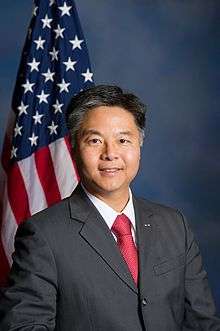 Ted Lieu (D-Torrance) Ted Lieu (D-Torrance) |
Democratic | D+11 | January 3, 2015 – present | .tif.png) |
| 34th |  Xavier Becerra (D-Los Angeles) Xavier Becerra (D-Los Angeles) |
Democratic | D+30 | January 3, 1993 – present | .tif.png) |
| 35th | 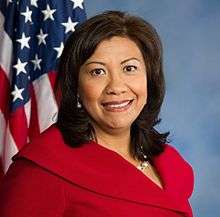 Norma Torres (D-Pomona) Norma Torres (D-Pomona) |
Democratic | D+15 | January 3, 2015 – present | .tif.png) |
| 36th | 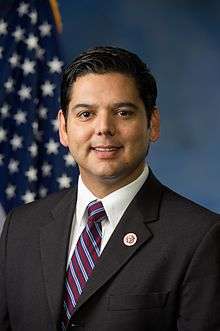 Raul Ruiz (D-Palm Desert) Raul Ruiz (D-Palm Desert) |
Democratic | R+1 | January 3, 2013 – present | .tif.png) |
| 37th | 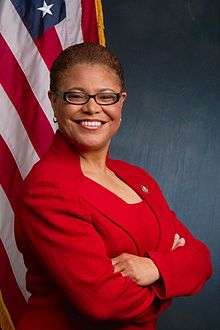 Karen Bass (D-Los Angeles) Karen Bass (D-Los Angeles) |
Democratic | D+34 | January 3, 2011 – present | .tif.png) |
| 38th |  Linda Sánchez (D-Orange) Linda Sánchez (D-Orange) |
Democratic | D+12 | January 3, 2003 – present | .tif.png) |
| 39th | 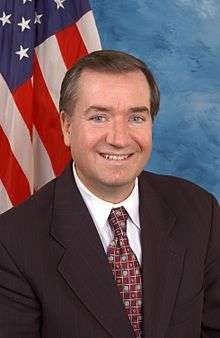 Ed Royce (R-(Fullerton) Ed Royce (R-(Fullerton) |
Republican | R+5 | January 3, 1993 – present | .tif.png) |
| 40th | 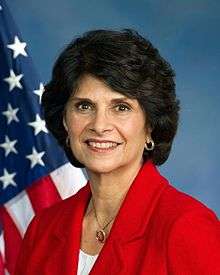 Lucille Roybal (D-Los Angeles) Lucille Roybal (D-Los Angeles) |
Democratic | D+29 | January 3, 1993 – present | .tif.png) |
| 41st | 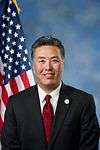 Mark Takano (D-Riverside) Mark Takano (D-Riverside) |
Democratic | D+9 | January 3, 2013 – present | .tif.png) |
| 42nd | 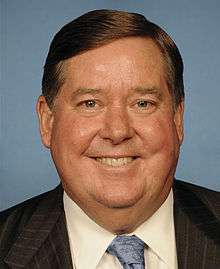 Ken Calvert (R-Corona) Ken Calvert (R-Corona) |
Republican | R+10 | January 3, 1993 – present | .tif.png) |
| 43rd | 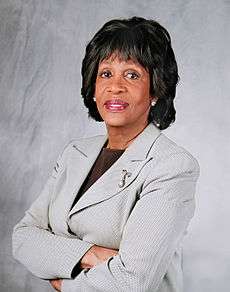 Maxine Waters (D-Inglewood) Maxine Waters (D-Inglewood) |
Democratic | D+26 | January 3, 1991 – present | .tif.png) |
| 44th | 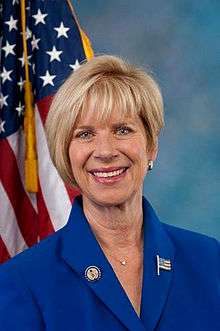 Janice Hahn (D-Compton) Janice Hahn (D-Compton) |
Democratic | D+32 | July 12, 2011 – present | .tif.png) |
| 45th |  Mimi Walters (R-Laguna Niguel) Mimi Walters (R-Laguna Niguel) |
Republican | R+7 | January 3, 2015 – present | .tif.png) |
| 46th |  Loretta Sanchez (D-Anaheim) Loretta Sanchez (D-Anaheim) |
Democratic | D+9 | January 3, 1997 – present | .tif.png) |
| 47th | 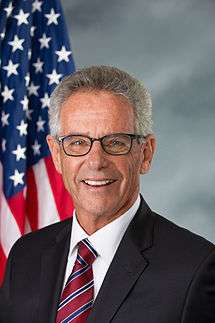 Alan Lowenthal (D-Long Beach) Alan Lowenthal (D-Long Beach) |
Democratic | D+8 | January 3, 2013 – present | .tif.png) |
| 48th | 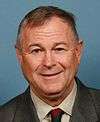 Dana Rohrabacher (R-Costa Mesa) Dana Rohrabacher (R-Costa Mesa) |
Republican | R+7 | January 3, 1989 – present | .tif.png) |
| 49th | 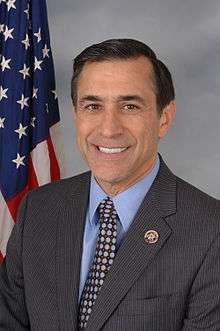 Darrell Issa (R-Vista) Darrell Issa (R-Vista) |
Republican | R+4 | January 3, 2001 – present | .tif.png) |
| 50th | 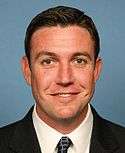 Duncan D. Hunter (R-Lakeside) Duncan D. Hunter (R-Lakeside) |
Republican | R+14 | January 3, 2009 – present | .tif.png) |
| 51st |  Juan Vargas (D-San Diego) Juan Vargas (D-San Diego) |
Democratic | D+16 | January 3, 2013 – present | .tif.png) |
| 52nd |  Scott Peters (D-La Jolla) Scott Peters (D-La Jolla) |
Democratic | D+2 | January 3, 2013 – present | .tif.png) |
| 53rd |  Susan Davis (D-San Diego) Susan Davis (D-San Diego) |
Democratic | D+10 | January 3, 2001 – present | .tif.png) |
Historical district boundaries
-
Districts from 2003 - 2013
See also
References
- ↑ "Supreme Court takes over remapping job". Sacramento Bee. September 26, 1991. Retrieved September 3, 2011.
- ↑ "Court Remap Plan Could Cut Democrats' Clout in California". Washington Post. December 4, 1991. Retrieved September 3, 2011.
- ↑ "Latinos May Gain Few Seats in Redistricting; Politics: Their push for more representation in Congress clashes with Democrats' desire to protect incumbents as district boundaries are redrawn". Los Angeles Times. August 26, 2001. Retrieved September 5, 2011.
- ↑ Citizens Commission website: background
- ↑ Redistricting Commission
- ↑ "California's citizen commission final district maps: Find out what's changed where you live.". Los Angeles Times. Retrieved September 5, 2011.
